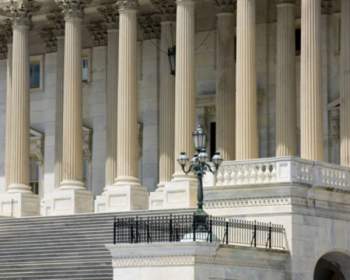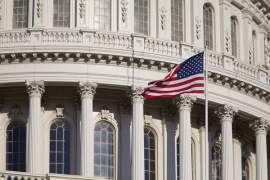
An Overview of the 18th Amendment

Popular In Constitution
Purpose Of Lifetime Appointment And Pros And Cons Enumerated Powers Bicameral Legislature Background Article 3 Of The Constitution We The People 1st Amendment Who Wrote The Constitution Judicial Review Equal Protection Clause 5th Amendment 10th Amendment Three Fifths Compromise
What is the 18th Amendment?
“Section 1. After one year from the ratification of this article the manufacture, sale, or transportation of intoxicating liquors within, the importation thereof into, or the exportation thereof from the United States and all territory subject to the jurisdiction thereof for beverage purposes is hereby prohibited.
Section 2. The Congress and the several States shall have concurrent power to enforce this article by appropriate legislation.
Section 3. This article shall be inoperative unless it shall have been ratified as an amendment to the Constitution by the legislatures of the several States, as provided in the Constitution, within seven years from the date of the submission hereof to the States by the Congress.
Section4. Cases relating to this question are presented and discussed under Article V.
Enforcement Cases produced by enforcement and arising under the Fourth and Fifth Amendments are considered in the discussion appearing under those Amendments.”
The 18th Amendment Defined
Date Proposed
The 18th Amendment was proposed on August 1st, 1917
Date Passed
The 18th Amendment was passed of January 16th, 1919
President of the United States
Woodrow Wilson was the President of the United States during the ratification of the 18th Amendment
Stipulations of the 18th Amendment
The 18th Amendment imposed a legislative statute entitled Prohibition, which limited the consumption of alcohol to a small amount of circumstances; however, the ownership, sale, or possession of alcohol was considered to be illegal
The 18th Amendment was due in part to a response from lobbying undertaken by the Temperance Movement – a social activist group promoting the cessation of mass-availability of alcohol within the United States
18th Amendment Facts
The Volstead Act (The National Prohibition Act), which was a legislative act passed defining and classification alcoholic beverages in the wake of the 18th Amendment, instituted a nationwide prohibition of alcoholic beverages effective January 17th, 1920
Due to the prohibition expressed within the 18th Amendment, clandestine institutions providing the illegal disbursement of alcohol emerged – these operations were commonly referred to as ‘Speakeasies’
States Ratifying the 18th Amendment
1. Alabama
2. Arizona
3. Arkansas
4. California
5. Colorado
6. Delaware
7. Florida
8. Georgia
9. Idaho
10. Illinois
11. Indiana
12. Iowa
13. Kansas
14. Kentucky
15. Louisiana
16. Maine
17. Maryland
18. Massachusetts
19. Michigan
20. Minnesota
21. Mississippi
22. Missouri
23. Montana
24. Nebraska
25. Nevada
26. New Hampshire
27. New Jersey
28. New Mexico
29. New York
30. North Carolina
31. North Dakota
32. Ohio
33. Oklahoma
34. Oregon
35. Pennsylvania
36. South Carolina
37. South Dakota
38. Tennessee
39. Texas
40. Utah
41. Vermont
42. Virginia
43. Washington
44. West Virginia
45. Wisconsin
46. Wyoming
States Not Participatory in the Ratification of the 18th Amendment
1. Connecticut
2. Rhode Island
Statutes Associated with the 18th Amendment
The 21st Amendment of the Constitution of the United States served to repeal the 18th Amendment; the 21st Amendment was a direct response to Prohibition – the 21st Amendment allowed for individual state Governments to regulate commercial activity with regard to alcoholic beverages
NEXT: Nineteenth Amendment





















